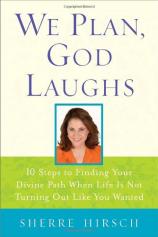Reading Group Guide
Discussion Questions
We Plan, God Laughs

Week One: Author’s Note, Introduction, and “What Happened?”
1. Narratives of our parents and other ancestors can have a tremendous impact on our own lives. What did the story of Sherre’s mother tell you about the author and her upbringing? Is there a “change of plans” narrative in your family’s legacy?
2. How did you define your happily ever after when you were younger? Do parts of your earliest plan still influence your goals and dreams?
3. How did you react to Sherre’s notion that God laughs with us, not at us, because he is deeply moved to see his children striving for greater responsibility? How had you previously perceived God’s reaction to your life?
4. Chapter One offers many examples of people whose plans were derailed in dramatic ways, as well as those who seem to have attained their desired place in life but were haunted by feelings of emptiness. Which category applies most closely to your experience? What disappointments do you wish to confront by embarking on the journey set forth in Sherre’s book?
Week Two: “Ending the Excuses”
1. What is the source of your most debilitating fears? Which of these fears caused you to pass up a land of milk and honey?
2. How did you respond to Sherre’s fill-in-the-blank sentence regarding “if onlys”?
3. Discuss the expectations others have placed on you throughout your life. How do your own dreams compare to those that have been wished for you?
4. What is the best way to find a happy medium between naysayers who quash your grand expectations and cheerleaders who entice you to strive for shallow expectations? What authentic dreams lie dormant in your soul?
Week Three: “Getting Present”
1. What oopses, ashamah, anger, and stolen caramels were captured in the list you pinned to your plastic chicken? In what ways had they burdened you? What had prevented you from letting them go previously?
2. What have been the most significant losses in your life? Did you allow yourself a substantial mourning ritual? Which sources of anger or grief are interfering with your prophet potential?
3. Make your last list: write down the lists that you are willing to throw away. In what way have these prerequisites and “shoulds” interfered with your destiny?
4. How did your contemporary yearbook exercise compare to descriptions of you when you were a senior in high school?
Week Four: “Celebrating the Divine You”
Spend today’s gathering describing the traits you most admire in one another. If you are working through the book alone, spend an hour creating a collection of uplifting words, pictures, or mementoes that capture your achievements, great and small.
Week Five, Two Chapters: “Partnering with God” and “Re-Creating Your Creator”
1. Where did your earliest perceptions of God come from? Were those early perceptions comforting, frightening, or something else altogether?
2. Discuss your reaction to Sherre’s observations about God’s desire to have a partnership with humanity. How does this philosophy compare to your experience of God? How has your partnership with God compared to your partnership with the people in your life?
3. Name one action you could take to try to “move the Spirit,” as Heschel recommended.
4. What words and images did you conjure in your newly envisioned version of God? What words or experiences formed your first prayer after this re-creation?
Week Six: “Finding Your Divine Spark”
Spend time uttering a blessing for even the most mundane aspects of your group’s gathering, or of your solitude. Afterward, take a few minutes to sit peacefully in silence, immersed in the single thought of being open to God’s light.
Week Seven, Two Chapters: “Engaging Up” and “Finding Meaning”
1. Look up --- at your job, your family, your home, your neighborhood, yourself. What do you see that you had overlooked before, due to inertia and routine?
2. Look closely --- at the people in your life, at your habits, at the way you spend your time. Which small tweaks might open the door to big change?
3. Who are the most courageous people you know? Who in your world most exudes shleimut? What inspiration can you take from such women and men as these?
4. In practical terms, what would it mean for you to focus on the process of living more than on the outcome of a plan, finding abundance in all you possess and respecting the transitory nature of happiness?
5. What would it mean for you to carry in one pocket the message that you are the center of the universe, and carry in the other pocket the message that you are but dust and ashes? Which of these messages has resided more forcefully in your soul? What would be achieved by balancing them?
Week Eight: “Questioning” and Conclusion
1. What freedom lies in the notion that it’s healthy to doubt God, and that mistakes contribute to your success? In what way do these concepts go hand-in-hand?
2. Choose one of the book’s stories --- ancient or contemporary --- to serve as your guiding inspiration. What drew you to this story? How will you integrate it into your personal life journey?
3. What tangible or intangible chametz must be cleansed from your life? Are there any relationships, routines, thoughts, or material goods that now seem to interfere with your partnership with God?
4. When looking back through the moments that sparked your soul, what is the common thread?
Has that spark been informing your life in a way that you have dismissed until now?
Who is your Shirley Colodny, who is the person who dismisses their own spark that you can see? Let them know how much they matter.
5. How does your current perception of your life compare to when you began reading We Plan, God Laughs?
We Plan, God Laughs
- Publication Date: April 1, 2008
- Hardcover: 208 pages
- Publisher: Harmony
- ISBN-10: 0385523610
- ISBN-13: 9780385523615







